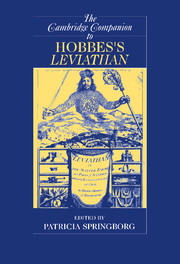Book contents
- Frontmatter
- General Introduction
- Part I: Of Man
- Part II: Of Commonwealth
- Part III: Of a Christian Commonwealth
- Part IV: Of the Kingdom of Darkness
- Part V: Hobbes’s Reception
- 18 Hobbes and His Contemporaries
- 19 The Reception of Hobbes’s Leviathan
- 20 Clarendon against Leviathan
- 21 Silencing Thomas Hobbes: The Presbyterians and Leviathan
- Bibliography
- Index
- Series List
19 - The Reception of Hobbes’s Leviathan
from Part V: - Hobbes’s Reception
Published online by Cambridge University Press: 28 November 2007
- Frontmatter
- General Introduction
- Part I: Of Man
- Part II: Of Commonwealth
- Part III: Of a Christian Commonwealth
- Part IV: Of the Kingdom of Darkness
- Part V: Hobbes’s Reception
- 18 Hobbes and His Contemporaries
- 19 The Reception of Hobbes’s Leviathan
- 20 Clarendon against Leviathan
- 21 Silencing Thomas Hobbes: The Presbyterians and Leviathan
- Bibliography
- Index
- Series List
Summary
The traditional story about the reception of Leviathan was that it was a book that was rejected rather than read seriously. Leviathan's perverse amalgamation of controversial doctrine, so the story goes, earned it universal condemnation. Hobbes was outed as an atheist and discredited almost as soon as the work appeared. Subsequent criticism was seen to be the idle pursuit of a discredited text, an exercise upon which young militant churchmen could cut their teeth, as William Warburton observed in the eighteenth century. We need to be aware, however, that this was a story that was largely the creation of Hobbes's intellectual opponents, writers with an interest in sidelining Leviathan from the mainstream of the history of ideas. Research over the last few decades has pointed increasingly towards a rather different account of the fate of Hobbes's most notorious work. It is true that the book attracted a large amount of hostile comment throughout the latter half of the seventeenth century, but the reason for this was not that Leviathan's arguments were too absurd to be taken seriously. In fact, in many cases Leviathan's critics were more moved to attack the book precisely because it was being read and used by many different individuals and groups. Leviathan's arguments addressed a whole range of religious and political debates in the later seventeenth century, and its dramatic contribution to those debates could not be ignored. As a result, the book remained a live issue in the political discourse of the period, even when it was subject to official condemnation.
- Type
- Chapter
- Information
- The Cambridge Companion to Hobbes's Leviathan , pp. 441 - 459Publisher: Cambridge University PressPrint publication year: 2007
- 7
- Cited by

